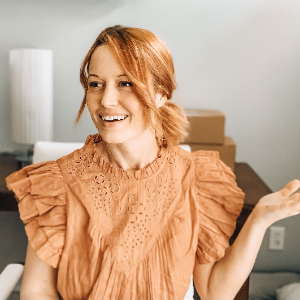Living a Minimalist Life: the #1 Key To Success
Nov 08, 2023
Everybody wants a shortcut; it’s human nature. So learning to declutter in order to achieve living a minimalist life seems like it should be enough. After all, minimalism is about ‘letting go,’ right?
But what happens after you let go? Decluttering is just the removal of 'things'. It doesn't include the foundation or basis for keeping them from tumbling back in. That’s why so many people declutter in cycles - it’s always damage repair.
As with any lifestyle change, you should start out with your ‘why’. I go into great detail about this here, where I share the first 3 steps to getting started with minimalism.
If your only reason is ""minimalism is trending,"" then you’re wasting your time. Without a truly personal reason, nothing will back you up when you face getting rid of those “just in case” items or the sentimental stuff that feels like ripping away a piece of yourself. Nothing will hold you back from buying out your favorite clothing store when you get a fat paycheck or have a particularly horrific week.
But after that - after you've identified why this lifestyle is right for you, there's one word (one key) that bridges the gap from a serial declutterer to someone who is living a minimalist life. That's what we're here to talk about today.
The key to living a minimalist life really boils down to one word.
Actually, with this one word you can change ANY area of your life. It’s a superpower we all have, yet we're constantly trying to drown it in random tedious information. That word is 'awareness' - specifically, self-awareness and awareness of your surroundings.
Self Awareness
Self-awareness is a road map that gets us from where we are to where we want to be. Without an intentional practice of self-awareness and relentless self-evaluation, you'll keep driving around in circles. A good place to start in living a minimalist life is to understand what type of clutter you hold onto and why.
Why do you hold onto the things you hold onto?
There are a whole lotta reasons we hold onto things - guilt, obligation, uncertainty, fear, sentiment. Fear is the most common. We fear letting go of the past, which causes us to hold onto old love letters or outgrown toys.
Fear of the future causes us to get stuck in ""just in case"" thinking. This is even more true if that item is attached to your identity: the guitar from college that you never learned to play, but you aren't ready to give up on the idea of someday serenading your house in a beautiful acoustic song. Why do you have your clutter?
What are your habits of weakness?
Now let's switch over to self-awareness with your habits. What are your weaknesses? Do you have unhelpful shopping tendencies? Are there certain items that you're especially drawn to?
The mind has a tendency to want more and less at the same time. This paradox develops a loop of dissatisfaction if we constantly feed into it. Become aware when your mind is pulling you toward this cycle. Then you can take some intentional actions to curb your shopping tendency if need be.
Ask yourself: Am I really in need of this thing, or am I just feeling that familiar pull for more? Remember, you already have what it takes to be successful at this. You have the key, you just have to use it.
Surroundings Awareness
Practice noticing your clutter before it even becomes clutter. Look around your home and think, ""would I notice something that didn't belong here?""
Pay attention to things like seasons of usefulness. There are so many belongings you really only need periodically - your kid's soccer uniform, peppermint cocoa that you only drink at Christmas, et cetera. Putting these things away when the season isn't right will help you to direct your energy to the things that are actually relevant.
Here's why people miss this!
A quick detour...
When I was in high school I practiced all summer long, and against all odds, became a varsity cheerleader. Varsity cheerleaders got to do cool things like skip class to make posters and walk around a Bible Belt school in a cheerleading outfit with a flyaway skirt. My modesty was only protected by a pair of black bloomers.
Like most 16-year-old girls, I was pretty insecure. So, I spent the majority of my morning tediously applying makeup and ensuring that every hair was in place.
In fact, I spent so much time applying this thin layer of makeup (that, seriously, nobody would be able to notice), that the rest of the morning was a frantic rush to get to school on time.
It wasn’t until I busted through the school doors that I realized there was more of a draft than usual in my cheerleading uniform. I had forgotten my bloomers! It was the closest I’ve ever come to the real-life version of the ‘naked at school’ nightmare.
They focus on the wrong things.
Because we feel the need to do something in order to make positive change and alleviate uncertainty in the outcome, we often focus on unimportant details. The things that nobody would likely even notice. We’re focusing on the “indiscernible makeup” instead of the key components (in my case, the bloomers).
We spend our energy wholeheartedly toiling over a few duplicate items, what to do with Aunt Shelly's birthday cards, or whether or not we really need that extra throw pillow.
Rather than worrying over a few small objects that won't make or break your home, focus that energy instead on strengthening your awareness muscle. Gain clarity around why you, specifically you, have the clutter that you have. Work from the inside out and don't get distracted by the little details.
Building awareness first makes the decisions of what to discard easier.
In the end, minimalism is a practice of awareness regarding your belongings, your time, and your energy and it takes practice to find your personal balance with your stuff.
However, when you become a student of awareness, the decisions become easier. You begin to intuitively know if an item is something you've been holding onto for the wrong reasons. You'll also begin to feel at ease in the process because adapting to living with less is a lot easier than you think.
The bottom line for living a minimalist life.
Don't be another information hoarder, collecting checklists and articles to make you feel like you're making progress. Do the hard internal work if you truly want lasting results in living a minimalist life.



